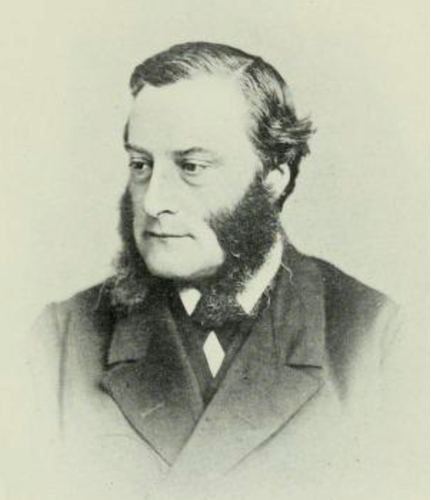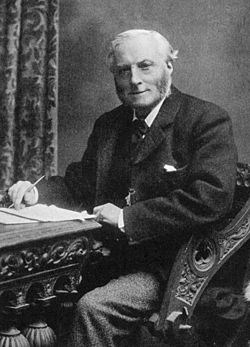The Long Fox Memorial Lecture
The Long Fox Memorial Lecture
This annual lecture was set up in 1902 in memory of Edward Long Fox junior.
His biography is given in George Munro Smith’s 1917 History of the Bristol Royal Infirmary from which most of this information is derived.
 Edward Long Fox as depicted in George Munro Smith's book The History of the Bristol Royal Infirmary
Edward Long Fox as depicted in George Munro Smith's book The History of the Bristol Royal Infirmary
Edward Long Fox, jun.was the son of Dr. Francis Ker Fox, of Brislington House, and grandson of Edward Long Fox, sen. who founded Brislington House. He was born in 1832, and received his early education from a private tutor, and at the Bath Grammar School. He was sent to Shrewsbury School in 1845, and in 1850 went to Balliol College, Oxford. He obtained a First Class in Natural Science in 1853; he then studied Medicine at Edinburgh and at St. George's Hospital, London. He took his degree of M.B. at Oxford in 1857, and the M.D. in 1861.
He was elected Physician to the Bristol Infirmary on September 3rd, 1857, and resigned in August 1877 in accordance with the twenty years rule. His physician colleagues at the infirmary included: William Budd, Frederick Brittan, Alexander Fairbrother and John Beddoe.
His most notable medical contribution was the control of the typhus epidemic in Bristol in 1863. He was also very active in the National Association for the Prevention of Consumption.
His first paper, in 1860, was on “Traumatic tetanus”,
From 1869 to 1874 he lectured on Medicine and Pathological Anatomy at the Bristol Medical School, in which he took a keen interest. He felt the importance of a good medical library, and considered that this, and a large and convenient room in which professional meetings could be held, should be in connection with the University College. He was amongst the first members of the Bristol Medico-Chirurgical Society, founded in 1874.
His magnum opus, The Pathological anatomy of the nervous centres (1874), was an attempt to understand and describe the inflammations, degenerations and neoplasms in the cerebrospinal system. It was regarded at the time as standard. Fox pictured disease in the nervous system as “Nature’s most delicate experiment”, the results of which he “hoped might be better elucidated by improved micro-pathological methods”.
In 1882 he gave the Bradshaw Lecture at the College of Physicians, of which he was made a Fellow in 1870. His second major work, The Influence of the sympathetic on disease (1885), was based on his Bradshaw Lecture and was again regarded by contemporaries as standard.
On June 2nd, 1888, he gave a dinner to a number of medical men at the Queen's Hotel, Clifton, in connection with a movement then on foot to establish a medical library. So successful was he in advocating this, that no less than £1,200 was promised by those present at the dinner. The Medico-Chirurgical Society's Library was founded in 1890 and in 1892 was combined with those of the Bristol Medical School, Royal Infirmary and General Hospital and formed the core of the University of Bristol Medical Library. The Medico-Chirurgical Society books were formally donated to the University in 1925.
His services at Clifton College (to which he was appointed Physician in 1862), and to many other local philanthropic and educational institutions, have been described elsewhere.
He was a frequent contributor to discussions, etc., at Medical Societies, and in 1894 was President of the British Medical Association. In his Presidential Address to the British Medical Association Medical men and the state he observed that “the troubles of the railway pace of life” were aiding crime and insecurity. There should, he said, be emphasis on close co-operation between the natural, the applied and the social sciences.
In 1894 he was also elected President of the National Temperance League. His last paper in 1898, was on the “Physical advantages of abstinence”.
He died, much lamented, on March 28th, 1902.
Dr. Fox was of middle height, strongly made, energetic in his movements, with a rather quick, determined walk. He was always neat in his person and dress, with a look of freshness and vivacity due to the brightness of his eyes and to his remarkably clear, ruddy complexion, which contrasted well with his black hair and whiskers. His expression was gentle and refined.
He was an excellent host, and told amusing anecdotes in a forcible, clever way; he always made his guests feel at home, and encouraged them to talk.
When he lived at Church House, Clifton, it was his custom to invite all the Bristol medical students and practitioners once a year to a "strawberry party." This function, which was held, weather permitting, in the pleasant garden at the back of his house, was very popular, and was much enjoyed by everyone.
He took a personal interest in all his pupils, looking after them in every way, guiding their studies, frequently asking them to his house, and, in the case of his clinical clerks, usually giving them some standard work on Medicine.
He knew very well how to utilise time; nearly always read journals or books whilst going his rounds in his carriage, and was impatient of delay at patients' houses.
He was rapid in diagnosis, and saw his Infirmary patients quickly, passing from one bed to another with a cheery word, or orders for some alteration in treatment. He had the knack of appearing to consult his senior pupils in a way which was very nattering, and even when he did not accept their opinions, he was so adroit that students frequently thought he was following their suggestions, when in fact he was adopting quite a different line of treatment.
Besides many contributions to journals, he published two books, The Influence of the Sympathetic on Disease, and The Pathological Anatomy of the Nervous Centres, both of which were considered at the time standard works
 Dr Edward Long Fox in 1902 - Wikipedia.
Dr Edward Long Fox in 1902 - Wikipedia.
Within weeks of his death in 1902, his friends met in the Chapter House of Bristol Cathedral to institute “an annual lecture at University College on some subject connected with medical science, to be known as the Long Fox Memorial Lecture”. The Lecture is usually given by a lecturer either selected from Bristol or the neighbourhood or who has been a student or a member of the teaching staff.
The first Long Fox Memorial Lecture was given by his friend John Beddoe on 4 November 1904 and was published in the Bristol Medico-Chirurgical Journal. Ever since then there has been an annual lecture convened by the Bristol Medico-Historical Society. The University of Bristol has held the endowment since 1958.
Past recent lectures
2021/22 Prof. Karen Forbes - 'Euthanasia - necessary kindness or unnecessary evil'
2020/21 Prof David Mumford - 'Cross cultural psychiatry and education'
2019/20 Prof Chris Salisbury - 'Designing health care for the people who need it'
2018/19 Prof. David Nutt - 'How revising the drug laws would lead to the revolution in brain medicine'
2017/18 Prof. Paul Goddard - 'Plague, Pestilence and War'
2016/17 Dr Jane Barrett - 'Are Medical Colleges relevant in 2016?'
2015/16 Prof. Roy Jones - Dementia care and research moving forwards: The Tortoise rather than the Hare?'
2014/15
2013/14 Dr Jerry Nolan - 'Staying alive with CPR - Vinnie Jones says "push hard and fast". Is he right?'
2012/13 Dr Sean O'Kelly - 'The Then (Fox's days) and The Now'
2011/12 Dr Mark Callaway - 'Integrated Imaging Vital to Patient Management'
2010/11 Prof. Angus Dalgleish - 'Therapeutic vaccines for HIV and cancer, and the implications for other chronic diseases'
2009/10 Prof Chris Salisbury:
2008/09
2007/08 Prof. Richard Hobbs - 'Saving Lives by Preventing Cardiovascular Disease'
2006/07 Prof. Andrew Wolf
2005/06 Rt. Hon. Frank Dobson M.P.
2004/05: Richard Gregory - 'Behind the Eyes- Before the Mind'
2003/04: Baroness Onora O'Neill - 'Trust and Accountability in Medicine'
2002/03: Professor Sir Denis Pereira Gray - 'The Human Side of Medicine'
2001/02: Professor Eric Thomas - 'How Can I be a Vice-Chancellor of the University of Bristol?'
2000/01: Professor Deborah Sharp - 'Undergraduate Medical Education in Primary Care: the Past, the Present and the Future'
1999/00: Professor David Nutt - 'The Chemical Brain'
1998/99: The Rt. Hon. The Lord Irvine of Lairg - 'The Patient, the Doctor, their Lawyers and the Judge: Rights and Duties'
1997/98: Professor John Terblanche - 'Healthcare in South Africa - a changing scene'
1996/97: Mr Paul Lear - 'Organ Transplantation'
1995/96: Dr. Sandy Macara - 'Policies for Healthcare - Retrospect and Prospect'
1994/95: Professor J. L. Burton - 'The Mysteries of Masculinity. Is the Modern Mister a Myth?'
1992/93: Professor Paul A. Dieppe - 'Arthritis is preventable, but at what cost and with what consequences?'
1991/92: Professor Gordon K. Wilcock - 'Alzheimer's Disease: Current Research'
1990/91: Mr. Hugh B. Coakham - 'Brain Tumours - Hopes for the Future'
1989/90: Professor June K. Lloyd - 'Coronaries, Cholesterol and Children'
1988/89: Dr. Alfred P. C. H. Roome - 'The A.I.D.S. Pandemic: Aspects of Epidemiology'
1987/88: Dr. Martin G. Mott - 'Mutation, Malformation and Malignancy'
1986/87: Mr. Charles N. Clarke - 'Health Care and Medical Education: A Conflict?'
1985/86: Mr. R. C. L. Feneley, F.R.C.S. - 'The Assessment of Urological Opprobia'